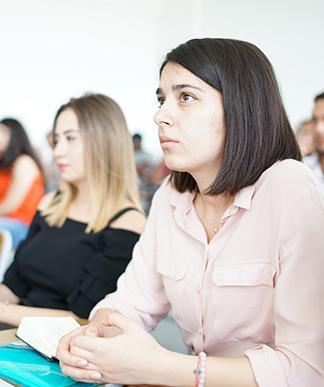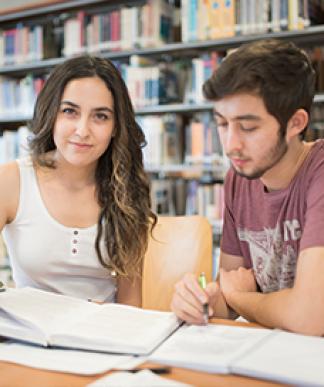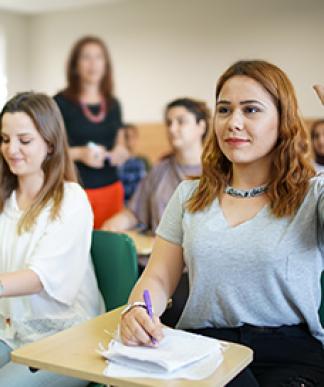


About the Program
Turkish Language Teaching Program addresses the need for Turkish teachers which emerged with the introduction of the second stage of primary education and with the increase of compulsory primary education to eight years. The program started education in the 2007–2008 academic year and offers a four-year long curriculum which involves courses on filed education and pedagogical knowledge and skills. With the introduction of the 4+4+4 education system, this department educates student-teachers to teach in the 5th, 6th, 7th and 8th grades. Compulsory and elective courses in the Turkish Language Teaching Program planned in a way to help our graduates gain knowledge and skills so that they can work with Turkish and foreign language learners, communicate with them effectively, take on social responsibility, internalize national values, respect universal values and be responsible citizens. They will also have competence, knowledge and skills to analyze Turkish literature such as novels, poems etc.
Education Opportunities
The Turkish Language Teaching Program is a four-year undergraduate program mainly focusing on contemporary, national and global values to train teachers who follow Ataturk’s principles. Our graduates are equipped with contemporary knowledge and individuals who are able to find solutions for the problems of our country and Turkish language. In addition to the educational activities carried out in the department, conducting scientific research is also encouraged. We invite lecturers and scholars who are well-known in their field to share their experiences and knowledge with our students through conferences and seminars. Moreover, we support our students’ clubs to organize social and cultural activities related to poetry, theatre studies, and creative drama to contribute to their pedagogical skills. These activities help our prospective teachers to express themselves more easily and develop their professional experiences.

Career Areas
Our graduates from Turkish Language Teaching Undergraduate Program will be able to work as Turkish language teachers in primary and secondary schools at 5th, 6th, 7th and 8th levels and also as Turkish language teachers in private schools and study centers affiliated to the Ministry of National Education. Additionally, there are many other job opportunities such as working in private and public organizations in media and publishing organizations, educational and cultural institutions within the country or abroad, archives and museums, Turkish centers in Turkish Republics, and working as academics in related departments of universities. Moreover, our graduates will be qualified enough to find jobs in the educational and cultural institutions abroad.
Contact
Faculty of Education
Çevik Uraz Center, CU 237
Tel: +90 392 671 1111 Extension: 2701
Faculty E-mail: secretary-foe@ciu.edu.tr
Head of Department: Asst. Prof.. Dr. Abbas HADIZADEH
Head of Department E-mail: ahadizadeh@ciu.edu.tr
Compulsory Courses
First Semester
INFORMATION TECHNOLOGIES
Course code
BILT123Credit
3Theoretical
3Practical
0Ects
5SOCIOLOGY OF EDUCATION
Course code
EGIT111Credit
2Theoretical
2Practical
0Ects
3INTRODUCTION TO EDUCATION
Course code
EGIT121Credit
2Theoretical
2Practical
0Ects
3ENGLISH LANGUAGE-I
Course code
INGL151Credit
2Theoretical
2Practical
0Ects
3ATATÜRK PRINCIPLES AND HISTORY OF TURKISH REFORMS-I
Course code
TARH101Credit
2Theoretical
2Practical
0Ects
3OTTOMAN TURKISH-I
Course code
TREG109Credit
3Theoretical
3Practical
0Ects
3TURKISH LANGUAGE - I
Course code
TREG121Credit
2Theoretical
2Practical
0Ects
4LITERATURE KNOWLEDGE AND THEORIES - I
Course code
TREG123Credit
2Theoretical
2Practical
0Ects
3TURKISH LANGUAGE - I
Course code
TREG127Credit
2Theoretical
2Practical
0Ects
3Second Semester
PHILOSOPHY OF EDUCATION
Course code
EGIT104Credit
2Theoretical
2Practical
0Ects
3EDUCATIONAL PSYCHOLOGY
Course code
EGIT122Credit
2Theoretical
2Practical
0Ects
3ENGLISH LANGUAGE-II
Course code
INGL152Credit
2Theoretical
2Practical
0Ects
3COMMUNITY SERVICE PRACTICES
Course code
SOSH100Credit
2Theoretical
1Practical
2Ects
3ATATÜRK PRINCIPLES AND HISTORY OF TURKISH REFORMS-II
Course code
TARH102Credit
2Theoretical
2Practical
0Ects
3TURKISH LANGUAGE-II
Course code
TREG122Credit
2Theoretical
2Practical
0Ects
4LITERATURE KNOWLEDGE AND THEORIES-II
Course code
TREG124Credit
2Theoretical
2Practical
0Ects
4TURKISH GRAMMAR-II
Course code
TREG128Credit
2Theoretical
2Practical
0Ects
3BASIC CONCEPTS OF LANGUAGE EDUCATION
Course code
TREG130Credit
2Theoretical
2Practical
0Ects
4Third Semester
RESEARCH METHODS IN EDUCATION
Course code
EGIT227Credit
2Theoretical
2Practical
0Ects
4TEACHING TECHNOLOGIES
Course code
EGIT233Credit
2Theoretical
2Practical
0Ects
4APPROACHES TO LEARNING AND TEACHING TURKISH
Course code
TREG223Credit
2Theoretical
2Practical
0Ects
4TURKISH FOLK LITERATURE-I
Course code
TREG225Credit
2Theoretical
2Practical
0Ects
3NEW TURKISH LITERATURE-I
Course code
TREG227Credit
2Theoretical
2Practical
0Ects
3TURKISH LANGUAGE-III
Course code
TREG229Credit
2Theoretical
2Practical
0Ects
3OLD TURKISH LITERATURE-I
Course code
TREG231Credit
2Theoretical
2Practical
0Ects
5UNIVERSITY ELECTIVE
Course code
UNISXX1Credit
3Theoretical
3Practical
0Ects
4Fourth Semester
PRINCIPLES AND METHODS OF TEACHING
Course code
EGIT206Credit
2Theoretical
2Practical
0Ects
4MEASUREMENT AND EVALUATION IN EDUCATION
Course code
EGIT224Credit
2Theoretical
2Practical
0Ects
4FREE ELECTIVE
Course code
SSECXX1Credit
2Theoretical
2Practical
0Ects
5FREE ELECTIVE
Course code
SSECXX2Credit
2Theoretical
2Practical
0Ects
5TURKISH TEACHING PROGRAMS
Course code
TREG224Credit
2Theoretical
2Practical
0Ects
3TURKISH FOLK LITERATURE-II
Course code
TREG226Credit
2Theoretical
2Practical
0Ects
3NEW TURKISH LITERATURE-II
Course code
TREG228Credit
2Theoretical
2Practical
0Ects
3UNIVERSITY ELECTIVE
Course code
UNISXX2Credit
3Theoretical
3Practical
0Ects
4Fifth Semester
CLASSROOM MANAGEMENT
Course code
EGIT301Credit
2Theoretical
2Practical
0Ects
4CURRICULUM DESIGN IN EDUCATION
Course code
EGIT335Credit
2Theoretical
2Practical
0Ects
3FREE ELECTIVE
Course code
SSECXX3Credit
2Theoretical
2Practical
0Ects
5CHILD LITERATURE
Course code
TREG215Credit
2Theoretical
3Practical
0Ects
3LISTENING EDUCATION
Course code
TREG321Credit
3Theoretical
3Practical
0Ects
5READING EDUCATION
Course code
TREG323Credit
3Theoretical
3Practical
0Ects
5LINGUISTICS
Course code
TREG325Credit
2Theoretical
2Practical
0Ects
4Sixth Semester
TURKISH EDUCATION SYSTEMS AND SCHOOL MANAGEMENT
Course code
EGIT326Credit
2Theoretical
2Practical
0Ects
3SPECIAL EDUCATION AND INCLUSION
Course code
OZEG322Credit
2Theoretical
2Practical
0Ects
3WRITING EDUCATION
Course code
TREG322Credit
3Theoretical
3Practical
0Ects
5SPEECH TRAINING
Course code
TREG324Credit
3Theoretical
3Practical
0Ects
6AREA ELECTIVE
Course code
TREGXX1Credit
2Theoretical
2Practical
0Ects
5AREA ELECTIVE
Course code
TREGXX2Credit
2Theoretical
2Practical
0Ects
5UNIVERSITY ELECTIVE
Course code
UNISXX3Credit
3Theoretical
3Practical
0Ects
4Seventh Semester
GUIDANCE IN SCHOOLS
Course code
EGIT403Credit
2Theoretical
2Practical
0Ects
3FREE ELECTIVE
Course code
SSECXX4Credit
2Theoretical
2Practical
0Ects
5TEACHING PRACTICE-I
Course code
TREG441Credit
5Theoretical
2Practical
6Ects
10THEATER AND DRAMA PRACTICES
Course code
TREG445Credit
2Theoretical
2Practical
0Ects
3AREA ELECTIVE
Course code
TREGXX3Credit
2Theoretical
2Practical
0Ects
5AREA ELECTIVE
Course code
TREGXX4Credit
2Theoretical
2Practical
0Ects
5Eighth Semester
TEACHING PRACTICE-II
Course code
TREG442Credit
5Theoretical
2Practical
6Ects
10TEACHING TURKISH AS A FOREIGN LANGUAGE
Course code
TREG444Credit
3Theoretical
3Practical
0Ects
5WORLD LITERATURE
Course code
TREG446Credit
3Theoretical
3Practical
0Ects
4AREA ELECTIVE
Course code
TREGXX5Credit
2Theoretical
2Practical
0Ects
5AREA ELECTIVE
Course code
TREGXX6Credit
2Theoretical
2Practical
0Ects
5Elective Courses
LANGUAGE AND SOCIETY
Course code
TREG405Credit
2Theoretical
2Practical
0Ects
0CYPRUS TURKISH LITERATURE
Course code
TREG420Credit
3Theoretical
3Practical
0Ects
CREATIVE WRITING
Course code
TREG436Credit
2Theoretical
2Practical
0Ects
MİNSTREL LITERATURE
Course code
TREG416Credit
3Theoretical
3Practical
0Ects
4LEXICOLOGY
Course code
TREG355Credit
2Theoretical
2Practical
0Ects
4MICRO-TEACHING
Course code
EGIT354Credit
2Theoretical
2Practical
0Ects
0VOCAL TRAINING AND DICTION
Course code
TREG357Credit
2Theoretical
2Practical
0Ects
COMPARATIVE EDUCATION
Course code
EGIT353Credit
2Theoretical
2Practical
0Ects
4CAREER PLANNING AND DEVELOPMENT
Course code
EGIT215Credit
2Theoretical
2Practical
0Ects
3MORALITY AND ETHICS IN EDUCATION
Course code
EGIT323Credit
2Theoretical
2Practical
0Ects
3ADDICTION AND ADDICTION STRUGGLE
Course code
EGIT361Credit
2Theoretical
2Practical
0Ects
3DRAMA IN EDUCATION
Course code
EGIT346Credit
2Theoretical
2Practical
0Ects
4MULTIPLE MENTAL ILLNESSES AND EDUCATION
Course code
OZEG411Credit
2Theoretical
2Practical
0Ects
4SCIENCE AND RESEARCH ETHICS
Course code
TEIB220Credit
2Theoretical
2Practical
0Ects
3MEDIA LITERACY
Course code
BOTE359Credit
2Theoretical
2Practical
0Ects
LANGUAGE ACQUISITION
Course code
TREG351Credit
2Theoretical
2Practical
0Ects
4CHILD PSYCHOLOGY
Course code
EGIT325Credit
2Theoretical
2Practical
0Ects
4Critical Reading
Course code
TREG352Credit
2Theoretical
2Practical
0Ects
4Exam Preparation and Evaluation in Turkish Teaching
Course code
TREG362Credit
2Theoretical
2Practical
0Ects
4ADULT EDUCATION AND LIFELONG LEARNING
Course code
EGIT360Credit
2Theoretical
2Practical
0Ects
4TURKISH COURSE BOOK EVALUATION
Course code
TREG403Credit
2Theoretical
2Practical
0Ects
5MODERN TURKISH LITERATURE
Course code
TREG422Credit
3Theoretical
3Practical
0Ects
CURRICULUM DESIGN IN EDUCATION
Course code
EGIT335Credit
2Theoretical
2Practical
0Ects
3EDUCATION LAW
Course code
OOEG418Credit
2Theoretical
2Practical
0Ects
CHARACTER AND VALUE EDUCATION
Course code
OOEG428Credit
2Theoretical
2Practical
0Ects
4PROJECT PREPARATION IN EDUCATION
Course code
EGIT349Credit
2Theoretical
2Practical
0Ects
4HAPPINESS
Course code
EGIT424Credit
2Theoretical
2Practical
0Ects
3TR Applicants
TR Students who are successful in the exams conducted by the Higher Education Council Student Selection and Placement Center (ÖSYM) and are entitled to enroll in our university in line with their preferences can complete the registration process with the necessary documents for registration from our Registration and Liaison Offices throughout Turkey or from the Marketing Directorate on campus.
Click for detailed admission requirements information.
TRNC Applicants
TRNC citizens and TR citizen candidate students who have completed their entire high school education in TRNC. They are placed in undergraduate programs in line with their success in the CIU Student Placement and Scholarship Ranking Exam and the programs they prefer.
Students who are successful in the exam can register from the TRNC Marketing Office.
Tuition Fees are determined at the beginning of each academic year. Candidate students who are entitled to enroll in CIU can learn their fees in line with the Tuition Fee Calculation system.